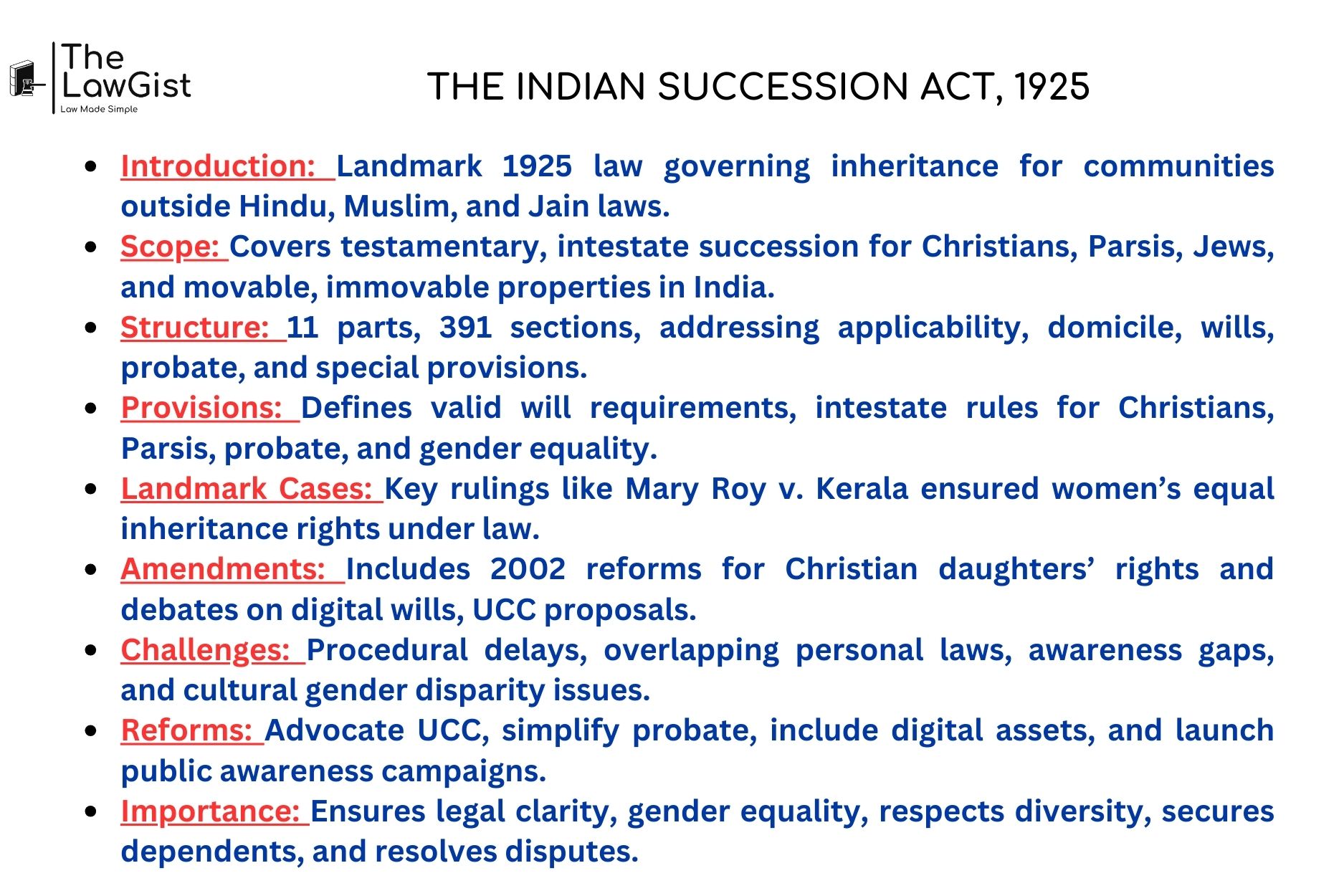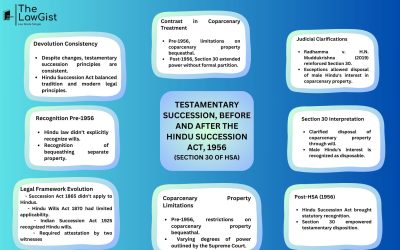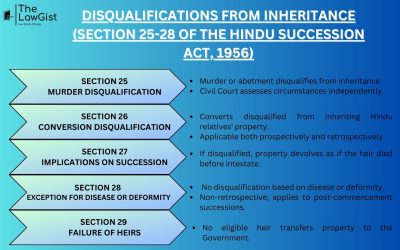
The Indian Succession Act of 1925 is a landmark piece of legislation that has remarkably shaped inheritance law in India. Enacted on 30 th September, 1925, it rules the succession of property for individuals who are not governed by personal laws like Hindu, Muslim, or Jain laws. The Act lays down the rules for both testamentary succession (based on a will) and intestate succession (when no will exists), giving accuracy and fairness in distribution of property.
This legal structure stands out for its developed outlook towards gender equality, by making sure that women have equal rights of inheritance, a topic that has seen remarkable judicial scrutiny and reform over the years. Legal experts, like those from ProCounsel and GetLegal India,stress on the important role of the Act in harmonizing the distribution of assets and solving disputes, particularly in cases of intestate succession.
While famous personalities may not have often commented on the Indian Succession Act specifically,the principles underlying this Act echo broadly in legal circles. As stated by Justice K.K. Verma, “The law must show the values of justice, equality, and fairness in the distribution of a deceased person’s estate.” By repeated and continuous amendments and judicial interpretations, the Indian Succession Act struggles to keep pace with strong societal requirements of India, ensuring a fair and just system of inheritance for all communities.
SCOPE OF THE ACT
- The act rules with testamentary succession for most communities except Muslims.
- It governs intestate succession for Christians, Parsis, Jews, and others not governed by personal laws.
- It covers movable and immovable properties within India.
STRUCTURE OF THE ACT
The Indian Succession Act,1925 is divided into 11 parts and 391 sections, showing different aspects of inheritance. Main parts include:
- Preliminary (Sections 1–2 of ISA)
Defines the applicability of the Indian Succession Act,1925 , Important words like will, executor, and administrator, and exclusions.
- Domicile (Sections 3–19 of ISA)
Develops the principle of domicile, stating that the laws of succession are ruled by the domicile of the deceased.
- Intestate Succession (Sections 20–56 of ISA)
Defines rules for distribution of property when no valid will exists, covering:
-
-
- Rights of heirs like spouses, children, and parents.
- Special sections for Parsis (Sections 50–56 of ISA).
-
- Testamentary Succession (Sections 57–191 of ISA)
Focuses on the processes of wills, codicils, probate, and requirements for creating valid wills:
-
-
- Must be freely and voluntarily made, signed by the testator, and attested by at least 2 witnesses present.
- Probate validates the will and is mandatory in a few cases.
-
- Probate and Letters of Administration (Sections 217–269 of ISA)
Manages procedures to validate a will or manage intestate estates, ensuring lawful inheritance.
- Special Sections for Parsis
Specific sections (e.g., 50–56 and 179–190) provide unique inheritance rules for Parsis, showing their cultural practices.
PROVISIONS OF THE ACT
Need for a Valid Will:
-
- Made with free and voluntary consent, without any influence,coercion or deception .
- The testator must have a sound mind and understands the outcome of the will.
- Signed by the testator in the presence of 2 witnesses at least.
- Intestate Succession
-
- Christians:
-
- Equal distribution between spouse and children.
- If there is no existence of any children , the spouse inherits the whole estate.
-
- Parsis:
-
- Specific rules for allocation among immediate and extended family members, ensuring impartial treatment.
-
- Christians:
- Probate and Administration
-
- Probate validates and authenticates the will through a process of court.
- Letters of Administration authorize managing the estate if no executor is named.
- Gender Equality
The Indian Succession Act makes sure that men and women are treated equally in matters of inheritance , unlike some personal laws.
LANDMARK CASES
-
- Overturned discriminatory sections of the Travancore Succession Act.
- Gave equal rights of inheritance to women of Syrian Christian under the Indian Succession Act.
- Clarence Pais v. Union of India (2001)
-
- Reaffirmed the validity of wills under the Act, showing testamentary autonomy.
- Jennifer Roderigues v. Rex Roderigues (2015)
-
- Shows procedural side of probating electronic wills, paving the way for modernization.
- Sarbati Devi v. Usha Devi (1984)
-
- Shed light that nominees do not inherit property; legal heirs have lawful claims under succession laws.
AMENDMENTS AND RECENT DEVELOPMENTS
- The Indian Succession (Amendment) Act, 2002
-
- Gave equal rights to Christian daughters to inherit property.
- Digital Wills and Technological Updates
-
- Judicial debates show the requirement to accommodate electronic wills and digital assets in inheritance laws.
- Gender-Neutral Reforms
-
- Calls for uniform laws to address unpredictability in gender equality across communities.
- Proposals for Simplification
-
- Advocacy for a Uniform Civil Code (UCC) to unite inheritance laws across religions.
CHALLENGES IN IMPLEMENTATION
- Overlapping Laws
-
- Conflicts occur due to parallel existence of personal laws and the Indian Succession Act.
- Procedural Difficulties
-
- Lengthy and long processes of probate and administration discourage rightful heirs.
- Lack of Awareness
-
- Many citizens remain ignorant of their rights, leading to exploitation or disputes.
- Gender Disparities
-
- Cultural practices sometimes blur legal provisions, disadvantaged women.
SUGGESTIONS FOR REFORM
- Uniform Civil Code
-
- Harmonizing inheritance laws under the UCC to make sure that individuals get equality and simplicity.
- Simplification of Processes
-
- Simplifying the procedures of probate and enhanced access to legal aid.
- Inclusion of Digital Assets
-
- Amendments made to acknowledge electronic wills and make sure of inheritance of digital property.
- Awareness Campaigns
-
- Educating citizens about their rights under the Indian Succession Act to decrease disputes and ensure justice.
IMPORTANCE OF THE INDIAN SUCCESSION ACT
- Ensures Legal Clarity
Gives a complete structure for property distribution, reducing ambiguities.
- Encourages Gender Equality
Promotes equal inheritance rights for men and women, aligning with constitutional values.
- Respects Religious Diversity
Balances uniformity with provisions for community-specific customs.
- Safeguards Family Welfare
Secures the rights of dependents, making sure that financial stability after the death of a family member.
- Resolves Disputes
Promotes the use of wills to prevent conflicts and gives legal recourse in case of disputes.
CONCLUSION
The Indian Succession Act, 1925, is a foundation of inheritance law in India, balancing the requirement for fairness, gender equality, and cultural sensitivity. Despite challenges in implementation, it gives a strong structure for property distribution and testamentary freedom.
As societal standards progress and technology advances, the Indian Succession Act must adapt through continuous amendments to address contemporary requirements like digital assets, gender-neutral reforms, and simplified processes. By modernizing its provisions and increasing public awareness, the Indian Succession Act can continue to uphold justice and harmony in inheritance matters across India.
Source







